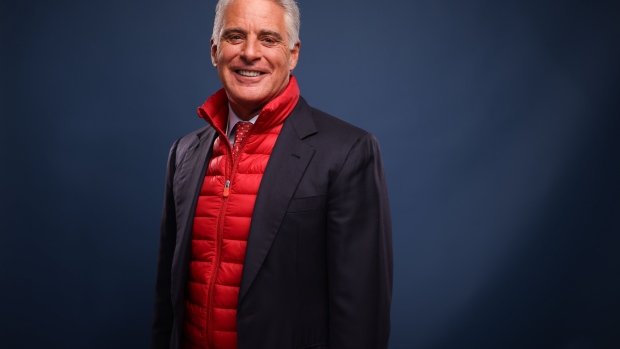Apr 17, 2024
UniCredit and Alpha Bank Chiefs Eye Romania Growth After Tie-Up
, Bloomberg News

(Bloomberg) -- Six months after announcing his first major deal as UniCredit SpA Chief Executive Officer, Andrea Orcel is sitting on the 29th floor of his Milan headquarters brimming with confidence.
The tie-up with Alpha Bank SA is going well and cooperation could end up going much further than the distribution agreement they had initially planned. After creating the No. 3 lender in Romania, the two firms may even team up on another takeover in that country once the integration of their two units is completed, he said in a joint interview with Alpha Bank CEO Vassilios Psaltis.
“We are both committed to Romania, we both like Romania, we both see a lot of value there,” Orcel said in the interview on Thursday afternoon. “If and when there were to be an opportunity, we would also consider acquisitions in cooperation.”
For Orcel, a consummate dealmaker, the Alpha Bank tie-up is arguably among the smaller transactions of his career. But it highlights his creative approach at a time when national interests and the unfinished project for a European banking union often stand in the way of cross-border deals. Born out of a desire to boost UniCredit’s size in Romania, the Alpha Bank tie-up it evolved into a partnership that Orcel says may become a model for how the Italian lender enters new markets.
For Alpha Bank, whose Romanian growth plans were put on ice during Greece’s financial crisis, the deal was a way to extract value while keeping an investment in a larger lender that will serve its Greek clients operating in the country, Psaltis said.
“Romania is a great market,” he said, adding that expansion in the country would be pursued “jointly.”
Under the accord announced in October, UniCredit agreed to buy the Greek government’s 9% holding in Alpha Bank along with a majority stake in Alpha Bank’s Romanian unit, which it plans to merge with its own business in the country. The two sides also entered a distribution partnership and a joint venture in pension-saving products. Alpha Bank received €300 million in cash for the Romanian business and retained 9.9% of the merged entity.
“I’m very, very happy with what we have done,” Orcel said, calling the purchase of a minority stake in Alpha a “pilot” for new markets where it isn’t competing directly with the other bank. “There may be other markets where we’re interested to develop directly in central Eastern Europe. If I can replicate it with partners that make sense for UniCredit, I will.”
The two executives, who have known each other for a long time, met at UniCredit headquarters last week for a two-day workshop to strengthen cooperation and build up a common agenda. Psaltis gathered in Milan with a group of about 20 of his managers. In steering committee meetings, they outlined the next steps in implementing the accord. Another meeting is planned in Athens for the summer.
“While we are obviously the junior partner in this,” Psaltis said, UniCredit “is treating us as equal,” encouraging ideas and contributions. “That’s energizing for our teams,” he said.
Both managers portrayed their accord as an alternative way to promote bank integration in Europe. Orcel reiterated he has no plan to increase UniCredit’s stake in Alpha, and Psaltis argued that “as it stands right now, clearly this structure is very coherent.”
“What we’re trying to achieve here is at the very heart of the European experiment and if we are to really promote European integration, this is another way to achieve that,” he said.
The accord will generate an additional net profit for UniCredit of at least 100 million starting from 2026, most of that “from the Romanian leg,” Orcel said. The impact of the combination will be seen as soon as next year, he added.
The two CEOs said they’re confident that the cooperation between the two banks can go beyond initial expectations and involve payments, trade finance and capital markets activities.
“For example, in advisory or in capital market, we will be increasingly going together with a common target list where we can bring more breadth in terms of ability to risk capital,” Orcel said.
The transaction allows UniCredit to sell its products to Alpha Bank’s clients and strengthen its presence in Eastern Europe. For Alpha, which has almost a 25% share of corporates doing business in the country, having a strong partner “opens a window to the world for these companies,” Psaltis said.
©2024 Bloomberg L.P.






